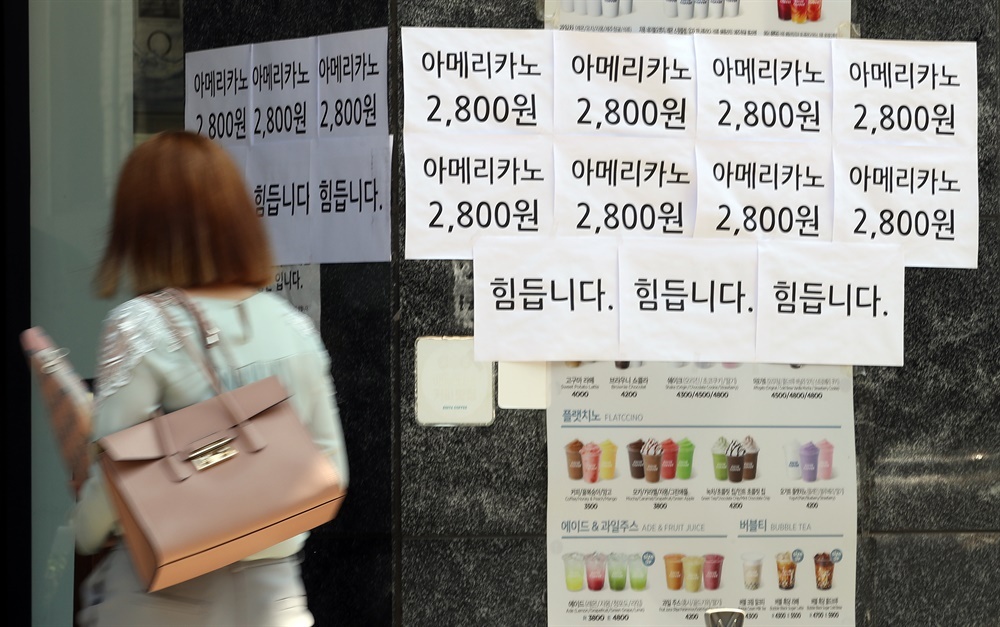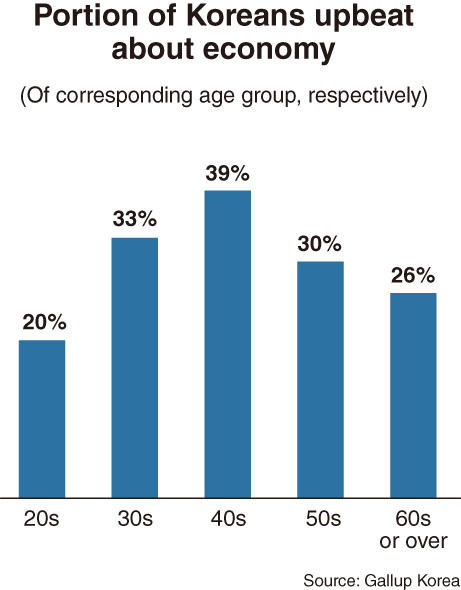[News Focus] Most age groups skeptical on economy
Pessimists outnumber optimists for 34 consecutive months
By Kim Yon-sePublished : March 30, 2021 - 16:37

SEJONG – Over the economic conditions in the coming year, a pessimistic stance was found to be dominant in most age groups in South Korea, with the only exception being people aged 40-49, a recent poll showed.
According to a survey released Saturday by Gallup Korea, gloomy predictions on the economy outnumbered positive predictions among people in their 20s, 30s, 50s and 60s or older. Optimists outnumbered pessimists only among those in their 40s.
By age group, 40 percent of those aged 18-29 predicted that the economic conditions would deteriorate in the coming year, while only 20 percent of them forecast a recovery from the current situation. And 39 percent responded that the economy for the coming year would be similar to the present.
Likewise, pessimists outnumbered optimists among those in their 30s by 34 percent vs. 33 percent, those in their 50s by 43 percent vs. 30 percent and those in their 60s or over by 45 percent to 26 percent.
In contrast, the portion of skeptical opinions was outstripped by positive opinions among those in their 40s by 27 percent vs. 39 percent.

By region, pessimists outnumbered optimists in Seoul, Gyeonggi Province-Incheon, Sejong-Daejeon-Chungcheong provinces, Daegu-North Gyeongsang Province, and Busan-Ulsan-South Gyeongsang Province.
Optimists outnumbered pessimists only in Gwangju and the North and South Jeolla provinces. Surveys of residents on Jeju Province and in Gangwon Province were not made public due to the relatively small number of people sampled there.
The portion of skeptical predictions was highest in Busan-Ulsan-South Gyeongsang at 45 percent, while optimistic predictions stayed at 31 percent in the southeast.
Next on the list were Seoul and Daegu-North Gyeongsang, both at 42 percent for pessimists. The portion of optimists in the two areas each posted 23 percent.
Sejong-Daejeon-Chungcheong saw pessimists outnumber optimists by 39 percent vs. 31 percent. The portion was 35 percent vs. 33 percent in Gyeonggi-Incheon.
Only in Gwangju and the North and South Jeolla provinces was the portion of pessimists outstripped by optimists at 24 percent vs. 35 percent.
By occupation, the percentage of skeptical forecasts was highest among housewives at 49 percent (vs. 23 percent optimists), followed by blue-collar workers including those engaging in the services industry at 42 percent (vs. 30 percent).
The next highest were recorded among the self-employed by 39 percent in pessimists (vs. 27 percent in optimists), college students by 36 percent (vs. 26 percent) and among the jobless and retirees by 32 percent (vs. 28 percent).
On the contrary, the portion of skeptical predictions was outstripped by positive predictions among white-collar workers 32 percent vs. 37 percent.
The percentages by sex were 39 percent in pessimists vs. 31 percent in optimists among men and 38 percent vs. 28 percent among women.
Though the survey results could be largely attributed to the COVID-19 pandemic, past polls by Gallup Korea showed that large percentages of people have not been upbeat about the economy, at least over the past three years.
According to its monthly surveys on economic prospects, pessimists have outnumbered optimists for 34 consecutive months, starting from June 2018, for all groups aged above 17.
A variety of polls have indicated that a large proportion of people have been frustrated with policies on sectors including real estate, taxation, employment and the self-employed.
By Kim Yon-se (kys@heraldcorp.com)








![[Graphic News] More Koreans say they plan long-distance trips this year](http://res.heraldm.com/phpwas/restmb_idxmake.php?idx=644&simg=/content/image/2024/04/17/20240417050828_0.gif&u=)
![[KH Explains] Hyundai's full hybrid edge to pay off amid slow transition to pure EVs](http://res.heraldm.com/phpwas/restmb_idxmake.php?idx=644&simg=/content/image/2024/04/18/20240418050645_0.jpg&u=20240419100350)





![[From the Scene] Monks, Buddhists hail return of remains of Buddhas](http://res.heraldm.com/phpwas/restmb_idxmake.php?idx=652&simg=/content/image/2024/04/19/20240419050617_0.jpg&u=20240419175937)

![[KH Explains] Hyundai's full hybrid edge to pay off amid slow transition to pure EVs](http://res.heraldm.com/phpwas/restmb_idxmake.php?idx=652&simg=/content/image/2024/04/18/20240418050645_0.jpg&u=20240419100350)

![[Today’s K-pop] Illit drops debut single remix](http://res.heraldm.com/phpwas/restmb_idxmake.php?idx=642&simg=/content/image/2024/04/19/20240419050612_0.jpg&u=)